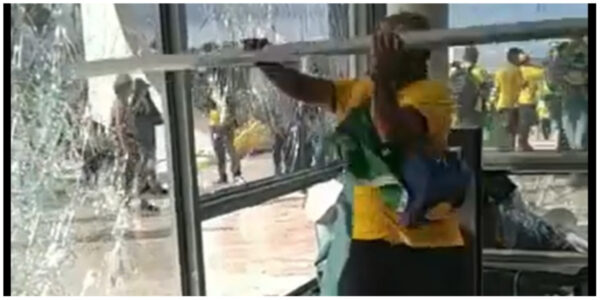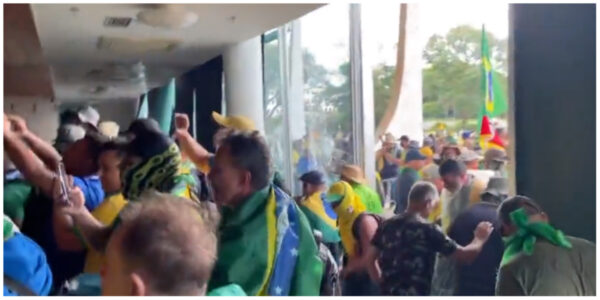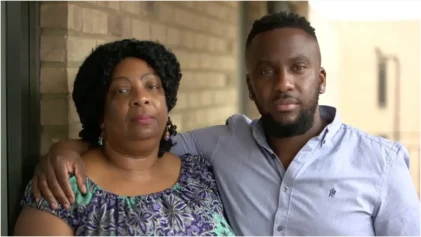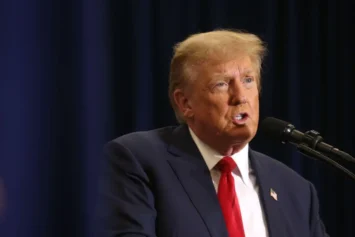Brazil is reeling after thousands of predominantly white Brazilians stormed the National Congress building in Brasilia on Jan. 8.
The mob of protesters sparked comparisons to America’s Jan. 6, 2021, insurrection, where mostly white Trump supporters stormed the Capitol building. However, Black Brazilians question if the government response would be different if protesters were of African descent.
The invasion follows the transfer of power from former Brazilian President Jair Bolsonaro to new President Luiz Inacio Lula da Silva.
“If the protesters had been Black, they would have all been shot,” is the sentiment of many Afro-Brazilians Elizabeth Hordge-Freeman said.
Hordge-Freeman is an associate professor of sociology at the University of South Florida and studied Brazil extensively. She has been a critic of Bolsonaro’s policies while in office which she says adversely affected Black Brazilians in areas of poverty, violence, and economic opportunity.
“The level of restraint shown to the protesters by the police is rarely, if ever, extended to Brazilians who are impoverished, marginalized or Black. These groups experience violence for even very minor infractions,” Hordge-Freeman said.
The invasion captured on social media shows Bolsonaro supporters, known as Bolsonaristas, dressed themselves in Brazilian flags and painted parts of their bodies yellow and green. They blew past security barriers in a cloud of pepper spray. Police used shields, attempting to keep protesters at bay with little success. Rioters managed to scale the walls, access rooftops, break windows and destroy offices amid the melee.
“The Planalto Palace, considered an architectural jewel…being destroyed by deranged Bolsonaro followers,” one person tweeted.

“Guns were also seized from a presidential security office,” Reuters reported.
Brazilian author Pedro Borges said amid the insurrection, “white privilege allows you to invade public buildings, beat up journalists, police officers, and get away with it.”
Brazilian historian Ana Flavia Magalhaes Pinto said Black and brown people are already being impacted by the insurrection.
“Black, poor and indigenous women once again, are already working hard to rebuild Brazil,” says an English translation from Portuguese of Ana Flavia Magalhaes Pinto’s tweet above a video of women cleaning up a vandalized building.
Erika Edwards is a history professor at the University of North Carolina Charlotte. She agrees with Hordge-Freeman’s assessment of Black Brazil’s feelings towards the invasion.
“Some Black Brazilians may feel this way due to historic and recent racialized attacks on predominantly Black communities,” Edwards said.
Despite hundreds of arrests, Edwards says the government response to the Capitol invasion heightens mistrust of the government by Black Brazilians.
“For many Black Brazilians, this will continue to justify their heightened awareness of racialized violence and mistrust of some governmental institutions,” Edwards said.
Brazilians of African descent make up nearly 56 percent, or roughly 119 million people, according to the Brazilian Institute of Geography and Statistics.
The National Congress building, Presidential Palace, and Supreme Court building were all targeted. Some 70 people were injured and at least 400 protesters were arrested, CNN reports.

The boisterous and conservative Bolsonaro has been compared to former U.S. President Donald Trump due to their similar personality and governing traits.
Hordge-Freeman calls him the “Trump of the Tropics.”
Bolsonaro lost to Lula 49.1 percent to 50.9 percent in the Oct. 30 election.
Bolsonaro refused to concede his defeat in the days following the election and questioned the integrity of the results. While not making many public comments since the election, Bolsonaro thanked his supporters and encouraged protests. Truckers supporting the former president blocked highways in the fall, protesting his loss.
Reuters reports Lula’s allies raised questions on why capitol police were unprepared and easily overwhelmed by protesters given their weeks-long public planning efforts on social media.
Lula proclaimed, “whoever did this will be found and punished” in a Twitter post condemning the capital invasion. He also accused Bolsonaro of encouraging the riots.
Bolsonaro has been in Florida since Dec. 30, drawing criticism from some U.S. Congressmen and women, including New York Democratic Rep. Alexandria Ocasio-Cortez.
“We must stand in solidarity with @LulaOficial’s democratically elected government. The U.S. must cease granting refuge to Bolsonaro in Florida,” Ocasio-Cortez’s tweet said.
A series of government investigations have begun to learn who orchestrated the invasion and who to hold accountable. Brazilian Justice Minister Flavio Dino said he will focus on who funded hundreds of buses into Brasilia for the insurrection and why security forces were not prepared.


